- Home
- Anthony Trollope
Phineas Finn, the Irish Member Page 16
Phineas Finn, the Irish Member Read online
Page 16
MY DEAR MR FINN,
I shall have some friends at Loughlinter next month, and should be very glad if you will join us. I will name the 16th August. I don't know whether you shoot, but there are grouse and deer.
Yours truly,
ROBERT KENNEDY.
What was he to do? He had already began to feel rather uncomfortable at the prospect of being separated from all his new friends as soon as the session should be over. Laurence Fitzgibbon had asked him to make another visit to County Mayo, but that he had declined. Lady Laura had said something to him about going abroad with her brother, and since that there had sprung up a sort of intimacy between him and Lord Chiltern; but nothing had been fixed about this foreign trip, and there were pecuniary objections to it which put it almost out of his power. The Christmas holidays he would of course pass with his family at Killaloe, but he hardly liked the idea of hurrying off to Killaloe immediately the session should be over. Everybody around him seemed to be looking forward to pleasant leisure doings in the country. Men talked about grouse, and of the ladies at the houses to which they were going and of the people whom they were to meet. Lady Laura had said nothing of her own movements for the early autumn, and no invitation had come to him to go to the Earl's country house. He had already felt that everyone would depart and that he would be left, – and this had made him uncomfortable. What was he to do with the invitation from Mr Kennedy? He disliked the man, and had told himself half a dozen times that he despised him. Of course he must refuse it. Even for the sake of the scenery, and the grouse, and the pleasant party, and the feeling that going to Loughlinter in August would be the proper sort of thing to do, he must refuse it! But it occurred to him at last that he would call in Portman Square before he wrote his note.
‘Of course you will go,’ said Lady Laura, in her most decided tone.
‘And why?’
‘In the first place it is civil in him to ask you, and why should you be uncivil in return?’
‘There is nothing uncivil in not accepting a man's invitation,’ said Phineas.
‘We are going,’ said Lady Laura, ‘and I can only say that I shall be disappointed if you do not go too. Both Mr Gresham and Mr Monk will be there, and I believe they have never stayed together in the same house before. I have no doubt there are a dozen men on your side of the House who would give their eyes to be there. Of course you will go.’
Of course he did go. The note accepting Mr Kennedy's invitation was written, at the Reform Club within a quarter of an hour of his leaving Portman Square. He was very careful in writing to be not more familiar or more civil than Mr Kennedy had been to himself, and then he signed himself ‘Yours truly, Phineas Finn.’ But another proposition was made to him, and a most charming proposition, during the few minutes that he remained in Portman Square. ‘I am so glad,’ said Lady Laura, ‘because I can now ask you to run down to us at Saulsby for a couple of days on your way to Loughlinter. Till this was fixed I couldn't ask you to come all the way to Saulsby for two days; and there won't be room for more between our leaving London and starting to Loughlinter.’ Phineas swore that he would have gone if it had been but for one hour, and if Saulsby had been twice the distance. ‘Very well; come on the 13th and go on the 15th. You must go on the 15th, unless you choose to stay with the housekeeper. And remember, Mr Finn, we have got no grouse at Saulsby.’ Phineas declared that he did not care a straw for grouse.
There was another little occurrence which happened before Phineas left London, and which was not altogether so charming as his prospects at Saulsby and Loughlinter. Early in August, when the session was still incomplete, he dined with Laurence Fitzgibbon at the Reform Club. Laurence had specially invited him to do so, and made very much of him on the occasion. ‘By George, my dear fellow,’ Laurence said to him that morning, ‘nothing has happened to me this session that has given me so much pleasure as your being in the House. Of course there are fellows with whom one is very intimate and of whom one is very fond, – and all that sort of thing. But most of these Englishmen on our side are such cold fellows; or else they are like Ratler and Barrington Erle, thinking of nothing but politics. And then as to our own men, – there are so many of them one can hardly trust! That's the truth of it. Your being in the House has been such a comfort to me!’ Phineas, who really liked his friend Laurence, expressed himself very warmly in answer to this, and became affectionate, and made sundry protestations of friendship which were perfectly sincere. Their sincerity was tested after dinner, when Fitzgibbon, as they two were seated on a sofa in the corner of the smoking-room, asked Phineas to put his name to the back of a bill for two hundred and fifty pounds at six months' date.
‘But, my dear Laurence,’ said Phineas, ‘two hundred and fifty pounds is a sum of money utterly beyond my reach.’
‘Exactly, my dear boy, and that's why I've come to you. D'ye think I'd have asked anybody who by any impossibility might have been made to pay anything for me?’
‘But what's the use of it then?’
‘All the use in the world. It's for me to judge of the use, you know. Why, d'ye think I'd ask it if it wasn't of use? I'll make it of use, my boy. And take my word, you'll never hear about it again. It's just a forestalling of my salary; that's all. I wouldn't do it till I saw that we were at least safe for six months to come.’ Then Phineas Finn with many misgivings, with much inward hatred of himself for his own weakness, did put his name on the back of the bill which Laurence Fitzgibbon prepared for his signature.
CHAPTER 13
Saulsby Wood
‘So you won't come to Moydrum again?’ said Laurence Fitzgibbon to his friend.
‘Not this autumn, Laurence. Your father would think that I want to live there.’
‘Bedad, it's my father would be glad to see you, – and the oftener the better.’
‘The fact is, my time is filled up.’
‘You're not going to be one of the party at Loughlinter?’
‘I believe I am. Kennedy asked me, and people seem to think that everybody is to do what he bids them.’
‘I should think so too. I wish he had asked me. I should have thought it as good as a promise of an under-secretaryship. All the Cabinet are to be there. I don't suppose he ever had an Irishman in his house before. When do you start?’
‘Well; – on the 12th or 13th. I believe I shall go to Saulsby on my way.’
‘The devil you will. Upon my word, Phineas, my boy, you're the luckiest fellow I know. This is your first year, and you're asked to the two most difficult houses in England. You have only to look out for an heiress now. There is little Vi Effingham; she is sure to be at Saulsby. Good-bye, old fellow. Don't you be in the least unhappy about the bill. I'll see to making that all right.’
Phineas was rather unhappy about the bill; but there was so much that was pleasant in his cup at the present moment, that he resolved, as far as possible, to ignore the bitter of that one ingredient. He was a little in the dark as to two or three matters respecting these coming visits. He would have liked to have taken a servant with him; but he had no servant, and felt ashamed to hire one for the occasion. And then he was in trouble about a gun, and the paraphernalia of shooting. He was not a bad shot at snipe in the bogs of county Clare, but he had never even seen a gun used in England. However, he bought himself a gun, – with other paraphernalia, and took a licence for himself, and then groaned over the expense to which he found that his journey would subject him. And at last he hired a servant for the occasion. He was intensely ashamed of himself when he had done so, hating himself, and telling himself that he was going to the devil headlong. And why had he done it? Not that Lady Laura would like him the better, or that she would care whether he had a servant or not. She probably would know nothing of his servant. But the people about her would know, and he was foolishly anxious that the people about her should think that he was worthy of her.
Then he called on Mr Low before he started. ‘I did not like to leave London without seeing you,�
� he said; ‘but I know you will have nothing pleasant to say to me.’
‘I shall say nothing unpleasant certainly. I see your name in the divisions, and I feel a sort of envy myself.’
‘Any fool could go into a lobby,’ said Phineas.
‘To tell you the truth, I have been gratified to see that you have had the patience to abstain from speaking till you had looked about you. It was more than I expected from your hot Irish blood. Going to meet Mr Gresham and Mr Monk, – are you? Well, I hope you may meet them in the Cabinet some day. Mind you come and see me when Parliament meets in February.’
Mrs Bunce was delighted when she found that Phineas had hired a servant; but Mr Bunce predicted nothing but evil from so vain an expense. ‘Don't tell me; where is it to come from? He ain't no richer because he's in Parliament. There ain't no wages. M.P. and M.T.,’ – whereby Mr Bunce, I fear, meant empty, – ‘are pretty much alike when a man hasn't a fortune at his back.’ ‘But he's going to stay with all the lords in the Cabinet,’ said Mrs Bunce, to whom Phineas, in his pride, had confided perhaps more than was necessary. ‘Cabinet, indeed,’ said Bunce; ‘if he'd stick to chambers, and let alone cabinets, he'd do a deal better. Given up his rooms, has he, – till February? He don't expect we're going to keep them empty for him!’
Phineas found that the house was full at Saulsby, although the sojourn of the visitors would necessarily be so short. There were three or four there on their way on to Loughlinter, like himself, – Mr Bonteen and Mr Ratler, with Mr Palliser, the Chancellor of the Exchequer, and his wife, – and there was Violet Effingham, who, however, was not going to Loughlinter. ‘No, indeed,’ she said to our hero, who on the first evening had the pleasure of taking her in to dinner, ‘unfortunately I haven't a seat in Parliament, and therefore I am not asked.’
‘Lady Laura is going.’
‘Yes; – but Lady Laura has a Cabinet Minister in her keeping. I've only one comfort; – you'll be awfully dull.’
‘I daresay it would be very much nicer to stay here,’ said Phineas.
‘If you want to know my real mind,’ said Violet, ‘I would give one of my little fingers to go. There will be four Cabinet Ministers in the house, and four un-Cabinet Ministers, and half a dozen other members of Parliament, and there will be Lady Glencora Palliser, who is the best fun in the world; and, in point of fact, it's the thing of the year. But I am not asked. You see I belong to the Baldock faction, and we don't sit on your side of the House. Mr Kennedy thinks that I should tell secrets.’
Why on earth had Mr Kennedy invited him, Phineas Finn, to meet four Cabinet Ministers and Lady Glencora Palliser? He could only have done so at the instance of Lady Laura Standish. It was delightful for Phineas to think that Lady Laura cared for him so deeply; but it was not equally delightful when he remembered how very close must be the alliance between Mr Kennedy and Lady Laura, when she was thus powerful with him.
At Saulsby Phineas did not see much of his hostess. When they were making their plans for the one entire day of this visit, she said a soft word of apology to him. ‘I am so busy with all these people, that I hardly know what I am doing. But we shall be able to find a quiet minute or two at Loughlinter, – unless, indeed, you intend to be on the mountains all day. I suppose you have brought a gun like everybody else?’
‘Yes; – I have brought a gun. I do shoot; but I am not an inveterate sportsman.’
On that one day there was a great riding party made up, and Phineas found himself mounted, after luncheon, with some dozen other equestrians. Among them were Miss Effingham and Lady Glencora, Mr Ratler and the Earl of Brentford himself. Lady Glencora, whose husband was, as has been said, Chancellor of the Exchequer, and who was still a young woman, and a very pretty woman, had taken lately very strongly to politics, which she discussed among men and women of both parties with something more than ordinary audacity. ‘What a nice, happy, lazy time you've had of it since you've been in,’ said she to the Earl.
‘I hope we have been more happy than lazy,’ said the Earl.
‘But you've done nothing. Mr Palliser has twenty schemes of reform, all mature; but among you you've not let him bring in one of them. The Duke and Mr Mildmay and you will break his heart among you.’
‘Poor Mr Palliser!’
‘The truth is, if you don't take care he and Mr Monk and Mr Gresham will arise and shake themselves, and turn you all out.’
‘We must look to ourselves, Lady Glencora.’
‘Indeed, yes; – or you will be known to all posterity as the fainéant government.’
‘Let me tell you, Lady Glencora, that a fainéant government is not the worst government that England can have. It has been the great fault of our politicians that they have all wanted to do something.’
‘Mr Mildmay is at any rate innocent of that charge,’ said Lady Glencora.
They were now riding through a vast wood, and Phineas found himself delightfully established by the side of Violet Effingham. ‘Mr Ratler has been explaining to me that he must have nineteen next session. Now, if I were you, Mr Finn, I would decline to be counted up in that way as one of Mr Ratler's sheep.’
‘But what am I to do?’
‘Do something on your own hook. You men in Parliament are so much like sheep! If one jumps at a gap, all go after him, – and then you are penned into lobbies, and then you are fed, and then you are fleeced. I wish I were in Parliament. I'd get up in the middle and make such a speech. You all seem to me to be so much afraid of one another that you don't quite dare to speak out. Do you see that cottage there?’
‘What a pretty cottage it is!’
‘Yes; – is it not? Twelve years ago I took off my shoes and stockings and had them dried in that cottage, and when I got back to the house I was put to bed for having been out all day in the wood.’
‘Were you wandering about alone?’
‘No, I wasn't alone. Oswald Standish was with me. We were children then. Do you know him?’
‘Lord Chiltern; – yes, I know him. He and I have been rather friends this year.’
‘He is very good; – is he not?’
‘Good, – in what way?’
‘Honest and generous!’
‘I know no man who I believe to be more so.’
‘And he is clever?’ asked Miss Effingham.
‘Very clever. That is, he talks very well if you will let him talk after his own fashion. You would always fancy that he was going to eat you; – but that is his way.’
‘And you like him?’
‘Very much.’
‘I am so glad to hear you say so.’
‘Is he a favourite of yours, Miss Effingham?’
‘Not now, – not particularly. I hardly ever see him. But his sister is the best friend I have, and I used to like him so much when he was a boy! I have not seen that cottage since that day, and I remember it as though it were yesterday. Lord Chiltern is quite changed, is he not?’
‘Changed, – in what way?’
‘They used to say that he was – unsteady you know.’
‘I think he is changed. But Chiltern is at heart a Bohemian. It is impossible not to see that at once. He hates the decencies of life.’
‘I suppose he does,’ said Violet. ‘He ought to marry. If he were married, that would all be cured; – don't you think so?’
‘I cannot fancy him with a wife,’ said Phineas. ‘There is a savagery about him which would make him an uncomfortable companion for a woman.’
‘But he would love his wife?’
‘Yes, as he does his horses. And he would treat her well, – as he does his horses. But he expects every horse he has to do anything that any horse can do; and he would expect the same of his wife.’
Phineas had no idea how deep an injury he might be doing his friend by this description, nor did it once occur to him that his companion was thinking of herself as the possible wife of this Red Indian. Miss Effingham rode on in silence for some distance, and then she said but one word more a
bout Lord Chiltern. ‘He was so good to me in that cottage.’
On the following day the party at Saulsby was broken up, and there was a regular pilgrimage towards Loughlinter. Phineas resolved upon sleeping a night at Edinburgh on his way, and he found himself joined in the bands of close companionship with Mr Ratler for the occasion. The evening was by no means thrown away, for he learned much of his trade from Mr Ratler. And Mr Ratler was heard to declare afterwards at Loughlinter that Mr Finn was a pleasant young man.
It soon came to be admitted by all who knew Phineas Finn that he had a peculiar power of making himself agreeable which no one knew how to analyse or define. ‘I think it is because he listens so well,’ said one man. ‘But the women would not like him for that,’ said another. ‘He has studied when to listen and when to talk,’ said a third. The truth, however, was, that Phineas Finn had made no study in the matter at all. It was simply his nature to be pleasant.
CHAPTER 14
Loughlinter
PHINEAS FINN reached Loughlinter together with Mr Ratler in a post-chaise from the neighbouring town. Mr Ratler, who had done this kind of thing very often before, travelled without impediments, but the new servant of our hero's was stuck outside with the driver, and was in the way. ‘I never bring a man with me,’ said Mr Ratler to his young friend. ‘The servants of the house like it much better, because they get fee'd; you are just as well waited on, and it don't cost half as much.’ Phineas blushed as he heard all this; but there was the impediment, not to be got rid of for the nonce, and Phineas made the best of his attendant. ‘It's one of those points,’ said he, ‘as to which a man never quite makes up his mind. If you bring a fellow, you wish you hadn't brought him; and if you don't, you wish you had.’ ‘I'm a great deal more decided in my ways than that,’ said Mr Ratler.
Loughlinter, as they approached it, seemed to Phineas to be a much finer place than Saulsby. And so it was, except that Loughlinter wanted that graceful beauty of age which Saulsby possessed. Loughlinter was all of cut stone, but the stones had been cut only yesterday. It stood on a gentle slope, with a greensward falling from the front entrance down to a mountain lake. And on the other side of the Lough 27 there rose a mighty mountain to the skies, Ben Linter. At the foot of it, and all round to the left, there ran the woods of Linter, stretching for miles through crags and bogs and mountain lands. No better ground for deer than the side of Ben Linter was there in all those highlands. And the Linter, rushing down into the Lough through rocks which, in some places, almost met together above its waters, ran so near to the house that the pleasant noise of its cataracts could be heard from the hall door. Behind the house the expanse of drained park land seemed to be interminable; and then, again, came the mountains. There were Ben Linn and Ben Lody; – and the whole territory belonged to Mr Kennedy. He was laird of Linn and laird of Linter, as his people used to say. And yet his father had walked into Glasgow as a little boy, – no doubt with the normal half-crown in his breeches' pocket.

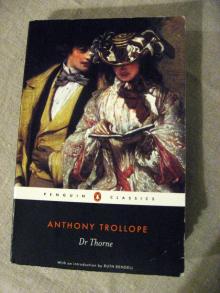 Doctor Thorne
Doctor Thorne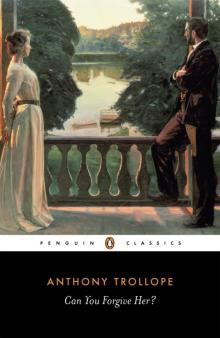 Can You Forgive Her?
Can You Forgive Her?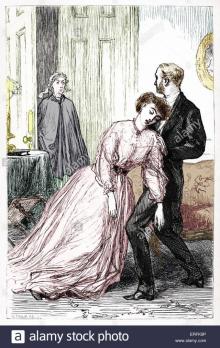 The Last Chronicle of Barset
The Last Chronicle of Barset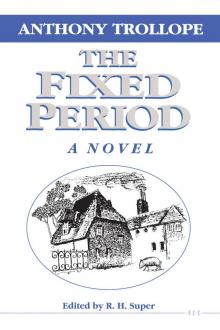 The Fixed Period
The Fixed Period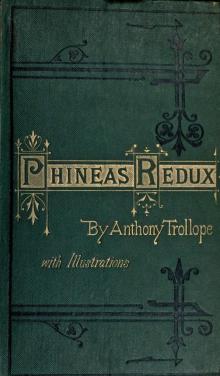 Phineas Redux
Phineas Redux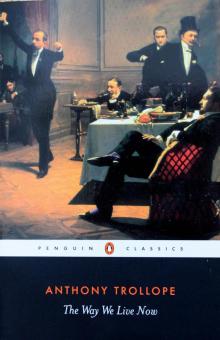 The Way We Live Now
The Way We Live Now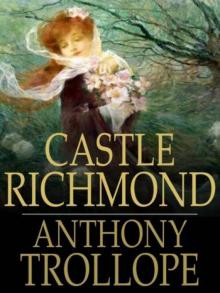 Castle Richmond
Castle Richmond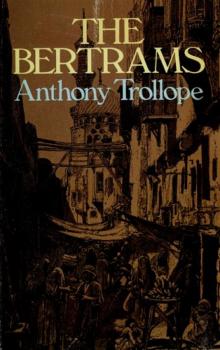 The Bertrams
The Bertrams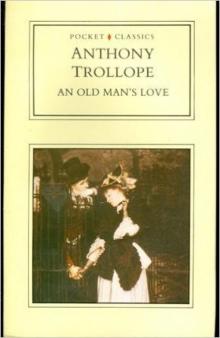 An Old Man's Love
An Old Man's Love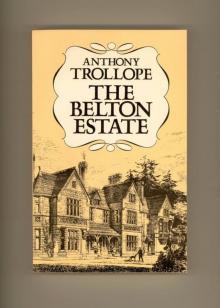 The Belton Estate
The Belton Estate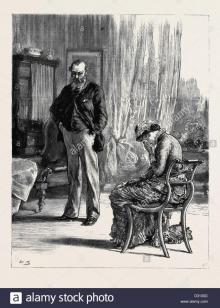 Marion Fay: A Novel
Marion Fay: A Novel The Claverings
The Claverings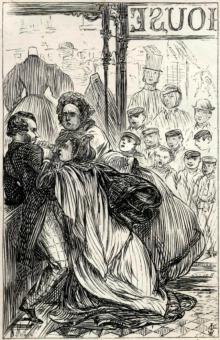 The Struggles of Brown, Jones, and Robinson
The Struggles of Brown, Jones, and Robinson Nina Balatka
Nina Balatka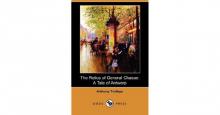 The Relics of General Chasse: A Tale of Antwerp
The Relics of General Chasse: A Tale of Antwerp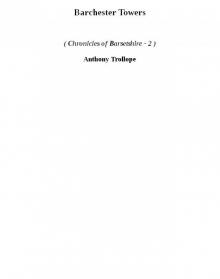 Barchester Towers cob-2
Barchester Towers cob-2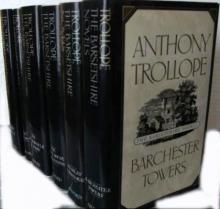 The Chronicles of Barsetshire
The Chronicles of Barsetshire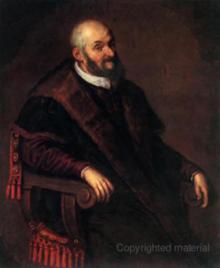 The Warden cob-1
The Warden cob-1 Framley Parsonage
Framley Parsonage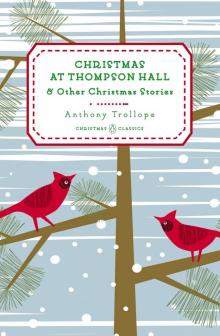 Christmas at Thompson Hall
Christmas at Thompson Hall The Warden
The Warden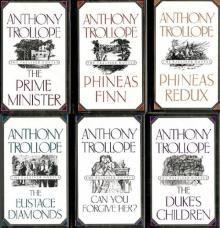 The Palliser Novels
The Palliser Novels The Small House at Allington
The Small House at Allington Barchester Towers
Barchester Towers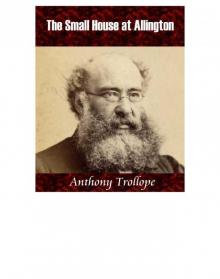 The Small House at Allington cob-5
The Small House at Allington cob-5 The Duke's Children
The Duke's Children Phineas Finn, the Irish Member
Phineas Finn, the Irish Member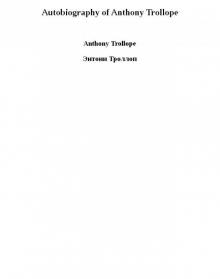 Autobiography of Anthony Trollope
Autobiography of Anthony Trollope